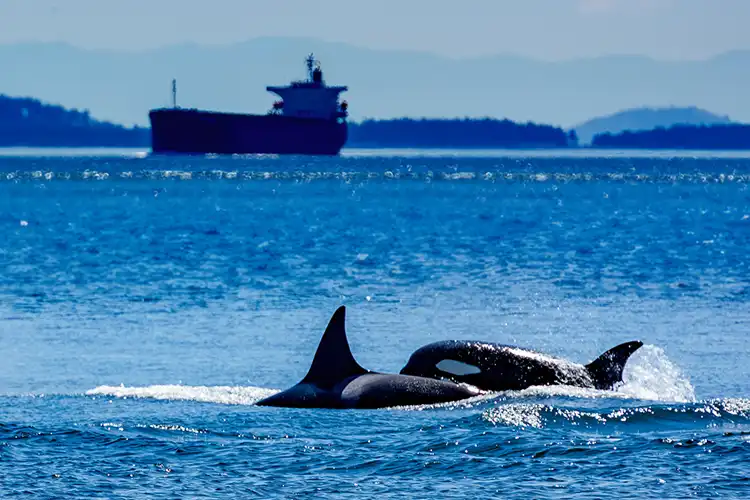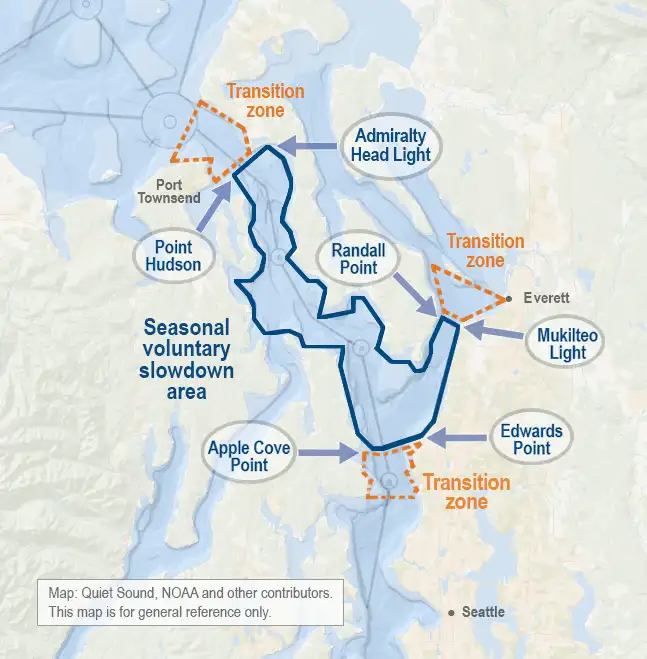
Puget Sound, located in Washington State in the northwest United States, is a critical habitat for the endangered population of Southern Resident killer whales – and an exceptionally busy shipping region, with seven deep-water ports in Puget Sound alone.
There are several narrow channels through which both large commercial vessels and the orcas must pass, creating a huge danger to the animals from both the traffic and the disorienting noise it makes.
The Voluntary Large Commercial Vessel Slowdown is an initiative of Quiet Sound, a collaborative programme between ports, agencies, indigenous tribes, and NGOs working with the Canadian and US shipping industries to reduce the threats to orcas and other marine mammals that inhabit Puget Sound, including several species of seal, sea lion, and minke, gray and humpback whales.
A Whale Report Alert System is also in place for both professional mariners and members of the public to report marine sightings, which are subsequently relayed to shipping traffic to warn it of when and where they need to be on the lookout for marine mammal activity.
Quiet Sound was launched as a trial program between 24 October and 12 January 2023, and was so successful that it received NOAA’s 2023 Partner in the Spotlight Award for its work to protect the Southern Resident orcas.
During the trial, 70 per cent of vessels transiting through the slowdown areas reduced their speed – 53 per cent of which reached Quiet Sound’s proposed speed limits.

The slowdown reduced sound levels by an average of 2.8 decibels – almost half (45 per cent) the normal levels – including in the frequencies that the Southern Resident orcas use to communicate and hunt.
In the 2023-24 slowdown, 71 per cent of vessel transits slowed, leading to a 50 per cent reduction in underwater noise intensity when the orcas were present.
‘The collaboration with our partners and industry is what makes this work,’ said Gretchen Hanshew, acting branch chief for the Protected Resources Division in NOAA Fisheries’ Seattle office. ‘Quiet Sound saw measurable improvements last year, so I am optimistic that we may see even larger noise reductions this year. We know that makes a meaningful difference for the whales by reducing how much energy they have to spend each day to survive.’
The 2024 slowdown will begin just after midnight on the day after Southern Residents enter the area – likely to be during September or October, as they follow the return of salmon and steelhead (rainbow trout) to the region – and will continue until 12 January 2025.

‘A voluntary slowdown achieves great results in quieting the waters for whales thanks to strong cooperation from the maritime sector,’ said Rachel Aronson, Director of Quiet Sound. ‘We thank the Puget Sound pilots, professional sailors, maritime shippers, the cruise industry and the tug sector for all they do on the water to help Washington’s blue economy and whales thrive together.’
‘The results from last year demonstrate that mariners took the slowdown seriously and most slowed down substantially, and that had just the benefit we were hoping to see—less noise underwater,’ said Hanshew ‘It’s great to see this kind of collaboration make such an important contribution to our recovery goals for Southern Resident killer whales.’
There are just 74 orcas remaining in the Southern Resident population of orcas, from a population of more than 200 that were thought to inhabit the Salish Sea before the turn of the 20th Century. The narrow channels and coves of Puget Sound made the orcas easy targets for hunting.
In 1970, approximately 80 orcas were herded into pens in Penn Cove during a single day. Seven young animals were taken to be placed in aquariums and theme parks, including Lolita – also called Tokitae, and known to the Indigenous Lummi people as Sk’aliCh’elh-tenaut – who very controversially died at the Miami Seaquarium in 2023.
Related articles
- Aggressor Adventures announces upgraded Red Sea Aggressor IV - 13 February 2026
- New documentary spotlights endangered sicklefin devil rays of the Azores - 13 February 2026
- DIVE’s Big Shot Light and Shadow – win an Aggressor Adventures liveaboard trip - 12 February 2026


